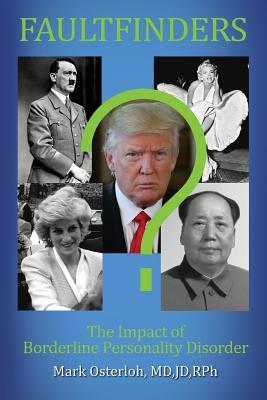Faultfinders: The Impact of Borderline Personality Disorder (BPD) describes the most devastating and least understood mental illness, affecting six percent of the population. Anger and relationship problems due to chronically finding faults in others are its most distinguishing features. Dr. Osterloh suggests Donald Trump may suffer from BPD in addition to his narcissistic and antisocial tendencies. Using over twenty compelling examples of famous actors, musicians, sports stars, leaders of countries, infamous criminals, and ordinary people, Dr. Osterloh makes the disease understandable. The lives of Adolf Hitler, Mao Zedong, Marilyn Monroe, Princess Diana, and others are used to illustrate BPD symptoms: extreme faultfinding, reckless impulsivity, moodiness, anger, self-mutilation, suicide, identity disturbance, boredom, abandonment fears, and paranoia. Common problems include inability to get along with others, eating disorders, substance abuse, and depression. Readers will be better prepared to identify, deal with, and help those they know who might have the disorder.

Faultfinders: The Impact of Borderline Personality Disorder
Faultfinders: The Impact of Borderline Personality Disorder (BPD) describes the most devastating and least understood mental illness, affecting six percent of the population. Anger and relationship problems due to chronically finding faults in others are its most distinguishing features. Dr. Osterloh suggests Donald Trump may suffer from BPD in addition to his narcissistic and antisocial tendencies. Using over twenty compelling examples of famous actors, musicians, sports stars, leaders of countries, infamous criminals, and ordinary people, Dr. Osterloh makes the disease understandable. The lives of Adolf Hitler, Mao Zedong, Marilyn Monroe, Princess Diana, and others are used to illustrate BPD symptoms: extreme faultfinding, reckless impulsivity, moodiness, anger, self-mutilation, suicide, identity disturbance, boredom, abandonment fears, and paranoia. Common problems include inability to get along with others, eating disorders, substance abuse, and depression. Readers will be better prepared to identify, deal with, and help those they know who might have the disorder.